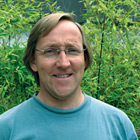From the guest editor: The Large Hadron Collider
 |
The start-up of the Large Hadron Collider at CERN next year promises to be the most exciting moment in particle physics for many years. It is also an opportunity to revitalize the publics interest in the field. With the LHC, we will be embarking on a new era of discovery, which is set to change our view of the universe. For example, the LHC is poised to give us an explanation for the origin of mass. We know that we live in a universe in which just four percent of the matter and energy is what we have so far thought of as ordinary. The rest is extraordinary, in the form of dark matter and energy. With the LHC we will begin our exploration of this extraordinary 96 percent. Also on the menu for the LHC: The differences between matter and antimatter, what matter would have been like at the beginning of time, and whether there are more dimensions to space and time than meet the eye.
These are subjects that can capture the public imagination, and the worlds particle physics community needs to be ready to satisfy the demand for information in a coherent and accessible way. The future of the field depends on it. The LHC brings a unique opportunity to rekindle the publics interest in particle physics, but also to reawaken engagement with physics as a whole, contributing to scientific literacy, and addressing the decline in interest in the subject at the university level.
But with any opportunity there are risks. People need to be reassured that particle physics is safe. They need to understand the cyclic nature of the field, with periods of discovery complemented by long periods of pain-staking research, to thoroughly understand what we have discovered. Discovery makes headline news all on its own; the necessary follow-up is a harder sell. Even though major discoveries to drive news coverage are rare, recent progress in particle physics has been remarkable. The next steps will be even more exciting. The LHC gives us the opportunity to share this message.
James Gillies, special issue guest editor
James Gillies is head of communications at CERN, the European particle physics laboratory in Geneva, Switzerland.
Click here to download the pdf version of this article.


